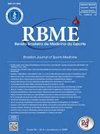SEDENTARY BEHAVIOR AMONG MEDICAL STUDENTS: REPERCUSSIONS OF THE CORONAVIRUS PANDEMIC
4区 医学
Q4 Health Professions
Revista Brasileira de Medicina do Esporte
Pub Date : 2024-01-01
DOI:10.1590/1517-8692202430012022_0407i
引用次数: 0
Abstract
ABSTRACT Introduction: In order to face COVID-19, social restriction measures were adopted that influenced the population's living habits, increasing sedentary lifestyle. Considering the high complexity and dedication required by the Medicine course, it becomes relevant to investigate the effect of the pandemic on the practice of physical exercise and sedentary behavior of these students. Objective: Identify changes in physical activity and sedentary behavior self-reported by medical students in the city of Salvador, Bahia, before and during the self-confinement imposed by the COVID-19 pandemic. Methods: Longitudinal, prospective, quantitative study carried out with regularly enrolled medical students over 18 years of age. A virtual, structured, anonymous, self-completed questionnaire was applied, containing sociodemographic and academic aspects. In addition, the International Physical Activity Questionnaire (IPAQ) was applied in its short version, considering the period before and during the pandemic. Through this, the level of physical activity, sedentary behavior and time spent walking and performing moderate and vigorous activities were measured. Results: 268 medical students were included, predominantly women (65.7%), white (50.0%) and mixed race (38.8%), aged 24.2 ± 5.5 years, single (90.7%), attending the clinical cycle (59.0%), in private institutions (78.4%). No statistically significant differences were identified in the level of physical activity and in the time spent with moderate and vigorous activities. However, there was a reduction in walking time (p<0.00001) and an increase in sedentary behavior (p=0.001) during the COVID-19 pandemic, with the greatest impact among women (p=0.0009). Conclusion: The repercussions of the COVID-19 pandemic have been shown to increase the sedentary behavior of medical students, especially among women, and to reduce activity time spent with walking. Longitudinal studies are needed to analyze the medium and long-term consequences of this change in the healthy lifestyle habits of medical students. Level of evidence II; Comparative prospective study.医学生的久坐行为:冠状病毒大流行的影响
摘要简介:为应对新冠肺炎疫情,采取社会约束措施,影响人群的生活习惯,增加久坐生活方式。考虑到医学课程的高度复杂性和奉献性,调查大流行对这些学生体育锻炼和久坐行为的影响变得有意义。目的:了解巴伊亚州萨尔瓦多市医学生自我报告的身体活动和久坐行为在2019冠状病毒病大流行之前和期间的变化。方法:采用纵向、前瞻性、定量研究,对18岁以上的常规招生医学生进行调查。一个虚拟的,结构化的,匿名的,自我完成的问卷被应用,包含社会人口和学术方面。此外,考虑到大流行之前和期间,采用了国际身体活动问卷(IPAQ)的简短版本。通过这项研究,研究人员测量了他们的身体活动水平、久坐行为和步行时间,以及进行适度和剧烈活动的时间。结果:共纳入268名医学生,以女性(65.7%)、白人(50.0%)和混血(38.8%)为主,年龄24.2±5.5岁,单身(90.7%),参加临床周期(59.0%),私立机构(78.4%)。在体力活动水平和花在适度和剧烈活动上的时间方面没有统计学上的显著差异。然而,在COVID-19大流行期间,步行时间减少(p<0.00001),久坐行为增加(p=0.001),其中对女性的影响最大(p=0.0009)。结论:COVID-19大流行的影响已被证明增加了医学生(尤其是女性)的久坐行为,并减少了步行的活动时间。需要进行纵向研究来分析医学生健康生活习惯改变的中长期后果。证据等级II;比较前瞻性研究。
本文章由计算机程序翻译,如有差异,请以英文原文为准。
求助全文
约1分钟内获得全文
求助全文
来源期刊

Revista Brasileira de Medicina do Esporte
PHYSIOLOGY-SPORT SCIENCES
自引率
0.00%
发文量
204
审稿时长
6-12 weeks
期刊介绍:
The Revista Brasileira de Medicina do Esporte (RBME in its Portuguese form) is an official organ of the Sociedade Brasileira de Medicina do Exercício e do Esporte (SBME) Brazilian Society of Exercise Medicine and Sports) and represents the main promotion resource of the scientific production in the Exercise Sciences and Sports Medicine (SBME) fields in our country. The RBME was launched in 1995 with trimester periodicity and became regularly bi-monthly published with no interruptions from 1999.
RBME is an inter-and multidisciplinary, peer reviewed, Open Access journal which accepts contributions from the national and international scientific community. RBME publishes original articles of high scientific relevance in Exercise and Sports Medicine, review articles, and systematic reviews.
RBME preferably publishes original articles of international interest, not only of regional significance. Its goal is to disseminate the scientific production in the areas of exercise and sports medicine through the publication of original research results and other documents that contribute to the scientific and applied knowlewdge of physical activity, exercise and sports, within the framework of biological sciences and medicina.
Its title abbreviation is Rev Bras Med Esporte, which should be used in references, footnotes and reference subtitles.
 求助内容:
求助内容: 应助结果提醒方式:
应助结果提醒方式:


